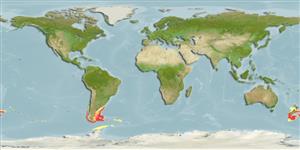>
Gadiformes (Cods) >
Gadidae (Cods and haddocks)
Etymology: Micromesistius: Greek, mikros = small + greek, mesos = middle + Greek, istion = sail (Ref. 45335).
More on author: Norman.
Environment: milieu / climate zone / depth range / distribution range
Ekologi
marina bentopelagisk; havsvandrande (Ref. 51243); djupintervall 50 - 900 m (Ref. 27363), usually 200 - 400 m (Ref. 7061). Temperate; 37°S - 65°S, 165°E - 34°W (Ref. 54589)
There are 2 disjunct populations. Micromesistius australis australis occurs around the Falkland Islands and Argentine Patagonia in the southwest Atlantic; off Chile in the southeast Pacific; also off South Georgia, South Shetland and South Orkney islands. Micromesistius australis pallidus occurs around the South Island of New Zealand.
Length at first maturity / Size / Vikt / Age
Maturity: Lm 33.7, range 33 - 40 cm
Max length : 90.0 cm TL hane/ej könsbestämd; (Ref. 1371); common length : 60.0 cm TL hane/ej könsbestämd; (Ref. 1371); publicerad maxvikt: 850.00 g (Ref. 4883); rapporterad maxålder: 30 år (Ref. 7059)
Taggstrålar i ryggfenan (totalt): 0; Mjukstrålar i ryggfenan (totalt): 43-55; Taggstrålar i analfenan 0; Mjukstrålar i analfenan: 56 - 71; Ryggkotor: 54 - 57
Invades shelf waters during summer and concentrating over the continental slope in winter. Forms schools (Ref. 9072). The young feed on euphausiids and amphipods and occasionally on copepods, cephalopods and small fish. Utilized in frozen blocks and as fishmeal. In Japan used as suerii (minced meat) for karaoke (fish cake) (Ref. 27363). Can be fried, microwaved and baked (Ref. 9988).
Oviparous, sexes are separate (Ref. 205).
Cohen, D.M., T. Inada, T. Iwamoto and N. Scialabba, 1990. FAO species catalogue. Vol. 10. Gadiform fishes of the world (Order Gadiformes). An annotated and illustrated catalogue of cods, hakes, grenadiers and other gadiform fishes known to date. FAO Fish. Synop. 125(10). Rome: FAO. 442 p. (Ref. 1371)
IUCN Red List Status (Ref. 130435)
Threat to humans
Harmless
Human uses
Fiskeri: kommersiellt viktig
Verktyg
Special reports
Download XML
Internet-källor
Estimates based on models
Preferred temperature (Ref.
123201): 3.4 - 9.1, mean 5.8 °C (based on 109 cells).
Phylogenetic diversity index (Ref.
82804): PD
50 = 0.7500 [Uniqueness, from 0.5 = low to 2.0 = high].
Bayesian length-weight: a=0.00372 (0.00223 - 0.00619), b=3.14 (2.99 - 3.29), in cm total length, based on LWR estimates for this species & (Sub)family-body (Ref.
93245).
Trofisk nivå (Ref.
69278): 3.8 ±0.50 se; based on food items.
Resiliens (Ref.
120179): Mellan, lägsta populationsfördubblingstid 1,4-4,4 år (K=0.18; tm=2-5; tmax=30).
Prior r = 0.54, 95% CL = 0.36 - 0.82, Based on 5 stock assessments.
Fishing Vulnerability (Ref.
59153): Moderate to high vulnerability (52 of 100).
Climate Vulnerability (Ref.
125649): Moderate to high vulnerability (53 of 100).
Nutrients (Ref.
124155): Calcium = 38.2 [10.7, 99.6] mg/100g; Iron = 0.368 [0.123, 1.121] mg/100g; Protein = 16.3 [14.4, 18.6] %; Omega3 = 0.381 [0.149, 0.940] g/100g; Selenium = 12.1 [3.0, 42.1] μg/100g; VitaminA = 9.29 [1.98, 46.46] μg/100g; Zinc = 0.673 [0.286, 1.563] mg/100g (wet weight); based on
nutrient studies.
